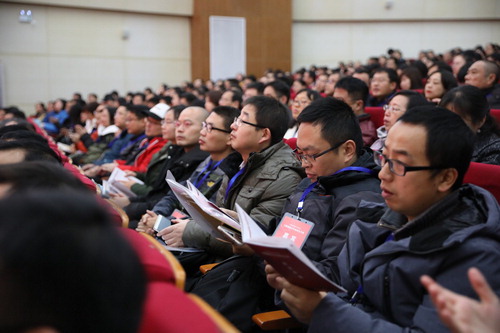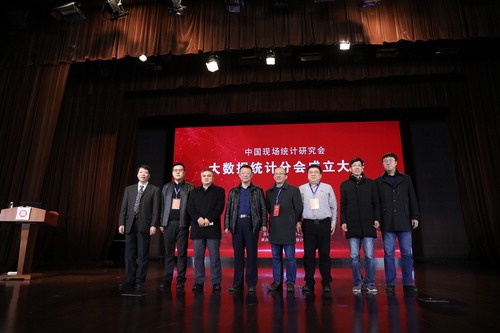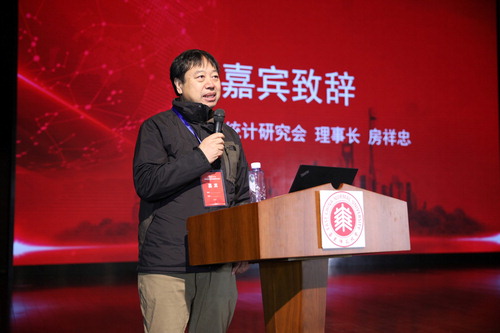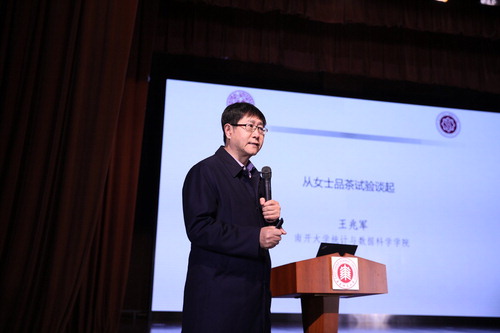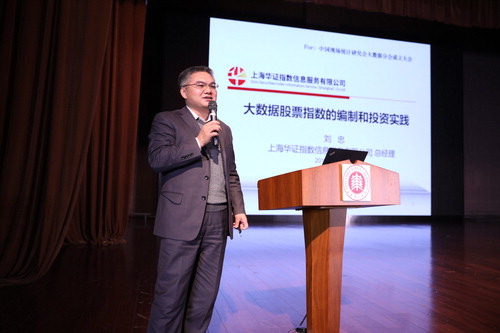ABSTRACT
The founding conference of the Big Data Statistics Branch (BDSB) of the Chinese Association for Applied Statistics (CAAS) was held on 8 December 2018, at East China Normal University (ECNU), Shanghai, China. More than 600 experts and scholars attended the conference. Professor Zhang Riquan was elected as the chairman of the first Board of Directors of the BDSB. Fang Xiangzhong, Chairman of the CAAS, delivered a speech. Professor Wang Zhaojun and Dr Liu Zhong delivered, respectively, keynote reports on the development of Big Data researches and practices, at the conference. The BDSB will be dedicated to building a high-level big data statistics exchange platform for experts and scholars in universities, governments, enterprises, and other fields to better serve the society and serve the country’s major strategies.
The founding conference of the Big Data Statistics Branch (BDSB) of the Chinese Association for Applied Statistics (CAAS) was held on 8 December 2018 at the Zizhu Concert Hall on Minhang Campus, East China Normal University (ECNU), Shanghai, China. More than 100 nationally renowned statisticians and data scientists, and more than 600 experts and scholars from 236 colleges, research institutes, societies, enterprises, and publishing houses in China attended the conference (Figure ).
The opening ceremony of the conference was presided over by Zhang Riquan, Dean and Professor of the School of Statistics of ECNU (Figure ).
Figure 2. Zhang Riquan, Dean and Professor of the School of Statistics of ECNU, presided over the founding congress of the BDSB.
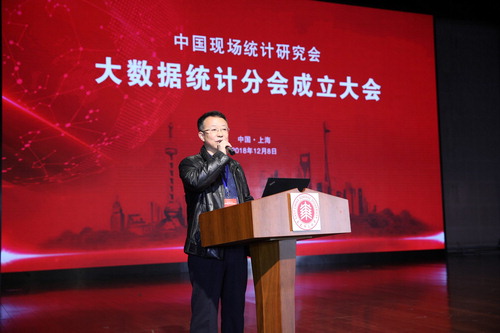
During the conference, the first Board of Directors of the BDSB was elected, which consists of 172 members, among which 59 are executive directors. Professor Zhang Riquan was elected as the chairman of the board. Professor Shi Lei from Yunnan University of Finance and Economics, Professor Mi Zichuan from Shanxi University of Finance and Economics, Professor Zou Changliang from Nankai University, Professor Zhao Peng from Jiangsu Normal University, and Liu Zhong, president of Sino-Securities Index Information Service (Shanghai) Co., Ltd., were elected as vice chairmen. Professor Zhang Yaofeng of Hubei University of Economics was elected as secretary general, and Professor Tang Yincai of ECNU was elected as deputy secretary general (Figure ).
Fang Xiangzhong, Chairman of the CAAS and a professor at Peking University, delivered a speech. He said that the establishment of the BDSB is a product of the development of the discipline under the new situation. He hopes that under the leadership of Chairman Zhang Riquan, the club will be well managed and strengthened (Figure ).
The last agenda of the congress is two keynote reports made by Professor Wang Zhaojun of Nankai University and Liu Zhong, President of Sino-Securities Index Information Service (Shanghai) Co., Ltd., respectively, which made the audience quite exciting (Figure ).
Prof. Wang’s report started with a dozen interesting cases in the design of statistics experiments from China and abroad, including the ‘lady tasting tea’ experiment devised by R. Fish (The Design of Experiments, 1935) and the experiments to identify the author(s) of great Chinese classic novel ‘the Red Chamber Dream’ by several Chinese statisticians, to illustrate C.R. Rao’s famous statement: ‘All methods of acquiring knowledge are statistics’ (Statistics and Truth: Putting chance to work, 1989). Then, by using various facts, he explained what statistics is, the relationship between statistics and data, and how the Big Data research and development become national strategies in China as well as in the United States. Finally, he reported that a series of measures have been taken by the Ministry of Education and Chinese universities to promote recruitment of and training for students in Big Data majors (Figure ).
In his report, Dr Liu illustrated how to construct a stock index – called Big Data Stock Index – by incorporating stock data indirectly or implicitly related in-market or out-of-market Big Data information into the sample selection or weighting of the index. The goal is to use more information and expect more timely and effective stock pricing, which in turn will result in better risk-return for index portfolios.
These reports won loud applause from the audience.
The BDSB will be dedicated to building a high-level big data statistics exchange platform for experts and scholars in universities, governments, enterprises, and other fields to better serve the society and serve the country’s major strategies.
Disclosure statement
No potential conflict of interest was reported by the author.
Additional information
Notes on contributors
Shanping Wang
Shanping Wang is a Senior Editor in the Editorial Office of Journal of East China Normal University at East China Normal University, Shanghai ,China.

